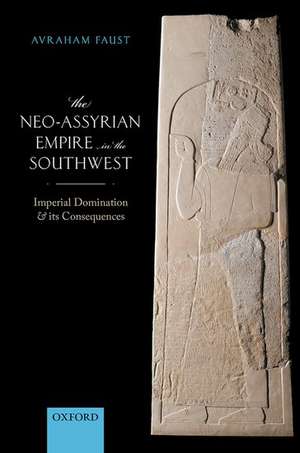The Neo-Assyrian Empire in the Southwest: Imperial Domination and its Consequences
Autor Avraham Fausten Limba Engleză Hardback – 28 ian 2021
Preț: 706.09 lei
Preț vechi: 946.50 lei
-25% Nou
Puncte Express: 1059
Preț estimativ în valută:
135.11€ • 140.16$ • 112.67£
135.11€ • 140.16$ • 112.67£
Carte tipărită la comandă
Livrare economică 17-22 martie
Preluare comenzi: 021 569.72.76
Specificații
ISBN-13: 9780198841630
ISBN-10: 0198841639
Pagini: 388
Dimensiuni: 165 x 240 x 28 mm
Greutate: 0.82 kg
Ediția:1
Editura: OUP OXFORD
Colecția OUP Oxford
Locul publicării:Oxford, United Kingdom
ISBN-10: 0198841639
Pagini: 388
Dimensiuni: 165 x 240 x 28 mm
Greutate: 0.82 kg
Ediția:1
Editura: OUP OXFORD
Colecția OUP Oxford
Locul publicării:Oxford, United Kingdom
Recenzii
Written primarily from an archaeological point of view, this book offers an excellent summary of the key data used by different scholars to offer rival interpretations of Assyria's impact on each main site in the Southwest Levant.
Faust's book is a major contribution to the field of the history of Israel and Judah in the eighth and seventh centuries, and will probably become a standard work for Biblical scholars and Assyriologists. Furthermore, it is highly recommendable for students in all branches of Biblical studies, so that they may learn how scientific knowledge is achieved in this field.
Wise vassals will pay tribute to acquire this volume.
Faust has provided a thoroughly researched and detailed study of the incursion and impact of Assyria on the Southwest Levant in the eighth and seventh centuries BCE, shedding light on and raising questions about this period of Biblical history. He has made a viable contribution to not only encourage the study of this period of Biblical history, but has also provided a wealth of material in both his notes and bibliography to encourage scholars and students to plunge into the subject and to pursue it even further as academic curiosity and the urge toward inquiry inspires them.
Faust has written a comprehensive and insightful study, well illustrated with several maps. It provides the specialist and the wider public with a detailed analysis and explicit interpretations of the evidence. This publication is currently the best summary of the Assyrian era in the southern Levant and will stimulate the ongoing debate and the research of this important period.
Biblical descriptions, combined with spectacular archaeological discoveries over the past two centuries, provide a good understanding of the period.
The book under review will be of great relevance to all those with an interest in the history and archaeology of Israel and Judah and their immediate neighbours, but also to those who study the Assyrian Empire and its mechanisms of governance and exploitation, and any archaeologist working with materials from this kingdom's centre, provinces and client states.
Faust's book is a major contribution to the field of the history of Israel and Judah in the eighth and seventh centuries, and will probably become a standard work for Biblical scholars and Assyriologists. Furthermore, it is highly recommendable for students in all branches of Biblical studies, so that they may learn how scientific knowledge is achieved in this field.
Wise vassals will pay tribute to acquire this volume.
Faust has provided a thoroughly researched and detailed study of the incursion and impact of Assyria on the Southwest Levant in the eighth and seventh centuries BCE, shedding light on and raising questions about this period of Biblical history. He has made a viable contribution to not only encourage the study of this period of Biblical history, but has also provided a wealth of material in both his notes and bibliography to encourage scholars and students to plunge into the subject and to pursue it even further as academic curiosity and the urge toward inquiry inspires them.
Faust has written a comprehensive and insightful study, well illustrated with several maps. It provides the specialist and the wider public with a detailed analysis and explicit interpretations of the evidence. This publication is currently the best summary of the Assyrian era in the southern Levant and will stimulate the ongoing debate and the research of this important period.
Biblical descriptions, combined with spectacular archaeological discoveries over the past two centuries, provide a good understanding of the period.
The book under review will be of great relevance to all those with an interest in the history and archaeology of Israel and Judah and their immediate neighbours, but also to those who study the Assyrian Empire and its mechanisms of governance and exploitation, and any archaeologist working with materials from this kingdom's centre, provinces and client states.
Notă biografică
Avraham Faust is Professor of Archaeology at the Department of General History, Bar-Ilan University. He is currently directing the excavations at Tel 'Eton in the Judean Shephelah, and the survey in its vicinity, and he is also the director of "The National Knowledge Center on the History and Heritage of Jerusalem and its Environs". His research interests include the archaeology of ancient Israel in the Bronze and Iron Ages (biblical archaeology), especially from social and anthropological perspectives, as well as aspects of settlement archaeology, ethnicity, processes of social complexity, and excavations and survey methods and methodology. He has more than 200 publications, covering various aspects of the region's archaeology from the Early Bronze Age to the Byzantine period, with a special focus on Iron Age society.
